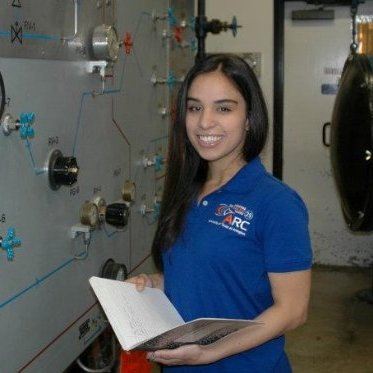Aerospace engineering student earns NASA fellowship

Honor includes internship at flight facility
A UT Arlington aerospace engineering student from Flower Mound has been awarded a prestigious NASA Harriet G. Jenkins Predoctoral Fellowship that will allow her to pursue her research into efficient jet engines in conjunction with the space agency.
Ezgihan “Izzy” Baydar and her adviser, Frank Lu, professor in the Mechanical and Aerospace Engineering Department, were awarded the three-year fellowship that provides $135,000 in funding and includes summer internships at the NASA’s Glenn Research Center in Cleveland, Ohio.
Baydar said she was always interested in math and science subjects from her days at Flower Mound High School, where she graduated in 2008.
“Since childhood, I have been fascinated by everything related to space: films, documentaries and books. I’ve always dreamed of joining the NASA team as an astronaut or scientist,” Baydar said. “Now, I have that opportunity, and I’m still a student.”
Lu, who also is the director of the UT Arlington Aerodynamics Research Center, described Baydar as a hard-working and dedicated student who is likely to go far based on the research she already has undertaken.
Baydar already has done research with UT Arlington Mathematics Professor Tuncay Aktosun. She’s also interned one summer at Los Alamos National Laboratories.
“Izzy learns quickly. Her work in mathematics will serve her well in aerospace engineering,” Lu said. “It’s a nice fit, which benefits her and is great for this University.”
Baydar said that was her goal ever since she enrolled at UT Arlington.
“I wanted to combine something that took advantage of my love of math and science. Aerospace engineering fits those interests well and it combines math, mechanical engineering, avionics and engine design,” Baydar said. “UT Arlington had an aerospace engineering bachelor’s-to-PhD program that appealed to me because of the opportunity it gave me for undergraduate research.”
Lu and Baydar’s work at NASA will focus on making air intakes more efficient in jet engines.
“We want to make more modern designs for these air inlets,” Baydar said. “We want them to be able to perform better at speeds between Mach 1 and Mach 2.”
Mach 1 is about 760 miles per hour.
The NASA Harriett G. Jenkins Graduate Fellowship Program has supported 211 students since 2001 as they obtained masters and doctoral degrees. The graduate fellowship seeks to support the development of the future Science, Technology, Engineering and Mathematics workforce through the increased number of graduate degrees awarded to underrepresented and underserved people, such as women, minorities and persons with disabilities.
The program’s goal is to address NASA’s mission-specific workforce needs and target areas of national need in minority STEM representation.
Baydar’s award of the NASA fellowship is but one representation of the outstanding work being done at The University of Texas at Arlington, a comprehensive institution of more than 33,300 and more than 2,200 faculty members in the heart of North Texas. Visit www.uta.edu for more information.
Herb Booth, hbooth@uta.edu, 817-272-7075
The University of Texas at Arlington, www.uta.edu
Tags:


